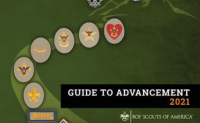We frequently encounter Scouts who just don’t do what we think they should be doing, like planning the details of this weekend’s campout, or setting up their tents before nightfall. On a larger scope, we wish our Scouts would move along with advancement a little quicker, instead of dragging their feet on requirements.
Some of our adults can give us the same fits – a committee member who won’t come to a meeting with essential information, or work on a task that’s in their area of responsibility. We wish we could say something or do something that would get them moving, or stop doing something that’s causing a problem.
When these things happen, we need to look deeper for clues as to what’s going on. There are several factors at work here:
- There could be a knowledge gap. It’s possible that they simply don’t know how to do the things they’re expected to do. Although Scouting is big on training – from adult leader training of all sorts to youth leader programs and the learning of Scout skills – sometimes the very thing they need to know isn’t taught in the structure of Scouting.
- Even if they have the knowledge, there may be other reasons why they’re not doing what we’d like. In the words of Rod Santomossimo, knowing isn’t doing. Simply having the knowledge isn’t sufficient; that knowledge has to be put into action in order for results to take place.
- And although they have the knowledge and the motivation, there could be a disconnect between your priorities and theirs. What we see as important may be several notches down for them. A committee member who has a big project at work may not have the time to pull together the details of the troop’s service project for this week’s committee meeting. And sometimes Scouts would rather play a game of Capture the Flag than set up their bunks for the night.
Try to take the time to observe what’s really going on so you can figure out the best approach. Information is important in any team activity, so make sure everyone knows the objective and has the knowledge to work toward the goal. Be clear when setting priorities; others have their own ideas about what’s important and what’s urgent. And motivate by setting an example, supplying encouragement and recognizing a job well done.
This post first appeared on Bobwhite Blather.



